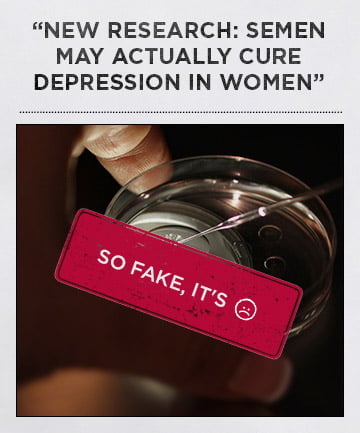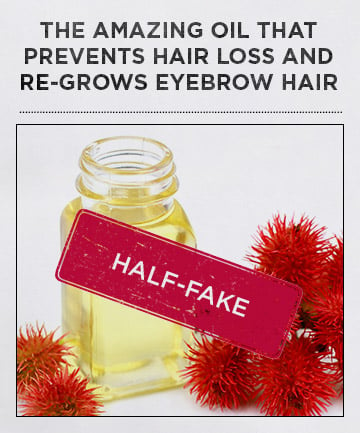The claim: This wacky interpretation of a clinical study about condom use asserts that, because women who don't use condoms "show fewer signs of depression," semen may "have an effect on women's moods" when it is "absorbed through the vagina."
Shared: 87.9K times
Fake or fact: So fake, it's ☹
Why: Although the referenced study clearly showed that women who don't use condoms with their sexual partners are less likely to be depressed, it's probably not because they're getting up close and personal with seminal fluid, experts say.
"The study found a correlation, but that does not show causation," says Heathman. "There are many other possible explanations that are more likely to be true. It may be that women engaged in sexual intercourse use fewer condoms when they trust their partners, or maybe they are confident in their alternative methods of contraception. Trusting and confident women are less likely to be depressed."
"Could a single protein or enzyme be manipulated in the future to treat some type of illness?" he asks. "Maybe, but ... trying this 'treatment' could cause a lot more harm than good through sexually transmitted diseases."
Dr. Nicole Prause, sexual psychophysiologist and founder of Liberos LLC in Los Angeles, California,, says she is "very familiar" with this "nightmare study." "To interpret refusing condoms as evidence it 'helps depression' is poor science at its worst," she says. "Data are far more consistent with the interpretation that people who have relationships in which they do not elect to use condoms are, on average, in relationships that are more stable and reinforcing. Social support has always been one of the strongest protectors against depression."
Image via Getty
Shared: 87.9K times
Fake or fact: So fake, it's ☹
Why: Although the referenced study clearly showed that women who don't use condoms with their sexual partners are less likely to be depressed, it's probably not because they're getting up close and personal with seminal fluid, experts say.
"The study found a correlation, but that does not show causation," says Heathman. "There are many other possible explanations that are more likely to be true. It may be that women engaged in sexual intercourse use fewer condoms when they trust their partners, or maybe they are confident in their alternative methods of contraception. Trusting and confident women are less likely to be depressed."
"Could a single protein or enzyme be manipulated in the future to treat some type of illness?" he asks. "Maybe, but ... trying this 'treatment' could cause a lot more harm than good through sexually transmitted diseases."
Dr. Nicole Prause, sexual psychophysiologist and founder of Liberos LLC in Los Angeles, California,, says she is "very familiar" with this "nightmare study." "To interpret refusing condoms as evidence it 'helps depression' is poor science at its worst," she says. "Data are far more consistent with the interpretation that people who have relationships in which they do not elect to use condoms are, on average, in relationships that are more stable and reinforcing. Social support has always been one of the strongest protectors against depression."
Image via Getty
The claim: This article via theheartysoul.com recommends using castor oil to resolve a variety of ailments. It also promotes the oil for its supposed ability to prevent hair loss, thicken eyebrows and lashes, and encourage new hair growth.
Shared: 50.6K times
Fake or fact: Half-fake
Why: Like a lot of plant-based oils, there are many health benefits to castor oil, says Fusco. "Castor oil is rich in minerals, proteins, and omega fatty acids," she explains. She also notes that the oil has natural antifungal, antibacterial and anti-inflammatory properties.
"When applied to scalp and hair, it might be helpful in reducing build-up of dead skin cells, and [hydrating] the scalp," Fusco says. But would it actually prevent hair loss? "If someone is losing hair due to extensive build-up of dead skin cells, this would help," she responds.
However, if you've got normal, healthy hair, don't count on castor oil to make it thicker or speed its growth.
"[Castor oil's] omega-9 fatty acids can certainly help keep hair well-nourished and prevent it from drying out and breaking," says Sobel. "This will help maintain the hair growth you already have, but there are no studies to show that it can stimulate new hair growth."
Image via Getty
Shared: 50.6K times
Fake or fact: Half-fake
Why: Like a lot of plant-based oils, there are many health benefits to castor oil, says Fusco. "Castor oil is rich in minerals, proteins, and omega fatty acids," she explains. She also notes that the oil has natural antifungal, antibacterial and anti-inflammatory properties.
"When applied to scalp and hair, it might be helpful in reducing build-up of dead skin cells, and [hydrating] the scalp," Fusco says. But would it actually prevent hair loss? "If someone is losing hair due to extensive build-up of dead skin cells, this would help," she responds.
However, if you've got normal, healthy hair, don't count on castor oil to make it thicker or speed its growth.
"[Castor oil's] omega-9 fatty acids can certainly help keep hair well-nourished and prevent it from drying out and breaking," says Sobel. "This will help maintain the hair growth you already have, but there are no studies to show that it can stimulate new hair growth."
Image via Getty






